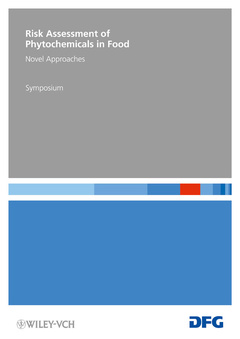Risk Assessment of Phytochemicals in Food Novel Approaches Forschungsberichte (DFG) Series
Coordonnateur : Eisenbrand G.

Supplemented by 40 poster contributions on phytochemicals and their effects.
I BERICHT UND SCHLUSSFOLRGERUNGEN
II REPORT AND CONCLUSIONS
III CONTRIBUTIONS
Visions on toxicity testing in the 21st century
Safety assessment of botanicals and botanical preparations used as ingredients in food supplements
In silico toxicology screening of the rodent carcinogenic potential of phytochemicals using QSAR analysis
Testing compuational toxicology models with phytochemicals
In silico models to establish level of safety concern in absence of sufficient toxicological data
In silico mehtods for physiologically based biokinetic models describing bioactivation and detoxification of coumarin and estragole; implications for risk assessment
In vitro models for carcinogenicity testing - reality or fantasy?
Carcinogen specific expression profiling: prediction of carcinogenic potential?
Safety and biological efficacy testing of phytochemicals: an industry approach
Metabolite profiling in rat plasma as a potential new tool for the assessment of chemically induced toxicity
Profiling techniques in nutrition and food research
The complex links between dietary phytochemicals and human health deciphered by metabolomics
Antioxidative and antigenotoxic properties of vegetables and dietary phytochemicals: the value of genomics biomarkers in molecular epidemiology
The Japanese toxicogenomics project: application of toxicogenomics
Toxicology and risk assessment of coumarin: focus on human data
Risk from furocoumarins in food? An exposure assessment
Transcriptome analysis in benefit-risk assessment of micronutrients and bioactive food components
Colorectal and prostate cancer: The role of candidate genes in nutritional pathways
Glucosinolates: DNA adduct formation in vivo and mutagenicity in vitro
Defense mechanisms against toxic phytochemicals in the diet of domestic animals
POSTERS
Coumarin risk assessment: Lessons from human data
Coffee and coffee compounds are effective antioxidants in human cells and in vivo
Studying absorption, distribution, metabolism, and excretion of a complex extract
Polyphenolic apple extracts and their constituents modulate DNA strand breaks and oxidation damage in human colon carcinoma cells
Comparative evaluation of experimental data on a-amylase inhibition by flavonoids using molecular modelling
Potential risk of furan in foods
Comparative study on the toxicity of alternariol and alternariol monomethyl ether in human tumor cells of different origin
A role for resveratrol and curcumine in sensitization of glioblastoma cells to genotoxic stress induced by alkylating chemotherapeutics
BfR-risk-assessment of alkaloids as ingredients and contaminants of food: quinine, opium alkaloids, senecio pyrrolizidine alkaloids
Elucidation of the genotoxic activity of the alkaloid ellipticine in human cell lines
Dietary supplements and herbal medicinal products - for a clear differentiation. Statement of the Society for Phytotherapy (GPT) to the "Article 13 Health Claim list" of the EFSA
Assessment of genotoxicity of herbal medicinal preparations according to the guideline EMEA/HMPC/107079/2007 -
A model project of Kooperation Phytopharmaka, Bonn, Germany
Implications for an adverse effect of vitamin C in photodynamic therapy
Using the nematode caenorhabditis elegans to identify des mode of action of the flavonoid myricetin
Low-Temperature Plasma -
Mild preservation technology for minimal processed fresh food?
Influence of fumonisin B1 on gene expression and cytokine production
Effects of quercetin on the detoxification of the food contaminant benzo[a]pyrene in the human intestinal Caco-2 cell model
Risk assessment of T-2 and HT-2 toxin using human cells in primary culture
Pyrrolizidine alkaloids in honey bee products
Identification of molecular determinants for cytotoxicity of isoliquiritigenin from liquorice (Glycyrrhiza glabra) towards leukemia cell lines
Functional effects of polyphenol metabolites produced by colonic microbiota in colon cells
Lifelong exposure to isoflavones results in a reduced responsivity of the mammary gland in female rats towards estradiol
Derivation of maximum amounts for the addition of functional ingredients to foods
Constituents of ginger induce micronuclei in two mammalian cell systems in vitro
Relative photomutagenic potency of furocoumarins and limettin
Degradation of green tea catechins
Evaluation of the cytotoxic effects of herbal homeopathic extracts in primary human hepatocytes in vitro
Modulation of antioxidant gene expression by apple juice in rats
Predictivity comparison between screening assays for bacterial mutagenicity for natural compounds: micro-ames vs. ames fluctuation method
Automated in vitro micronucleus testing of natural compounds in correlation with hydrogen peroxide
Permeability of apple polyphenols in T84 cell model and their influence on tight junctions
Influence of apple polyphenols on inflammatory gene expression
Diethylstilbestrol-like effects of genistein on gene expression of Wnt-signaling components in the endometrial Ishikawa cell line
Effect of dietary flavonoids in different cell lines: Comparison of uptake, modulation of oxidative stress and cytotoxic effects
Risk-benefit considerations of isoflavone supplements in the treatment of menopausal vasomotor symptoms
Effect of different catechins on the growth of HT-29 cells
Determination of the isoflavone content of soy-based infant formulas of the German market using a Box-Behnken experimental design for optimising the analytical conditions
MEMBERS OF THE DFG SENATE COMMISSION ON FOOD SAFETY
PARTICIPANTS AND CONTRIBUTORS OF THE SYMPOSIUM
The Deutsche Forschungsgemeinschaft is a German research funding organization. G. Eisenbrand is the editor of Risk Assessment of Phytochemicals in Food: Novel Approaches, published by Wiley.
Date de parution : 01-2011
Ouvrage de 476 p.
17.2x24 cm
Disponible chez l'éditeur (délai d'approvisionnement : 14 jours).
Prix indicatif 208,48 €
Ajouter au panier